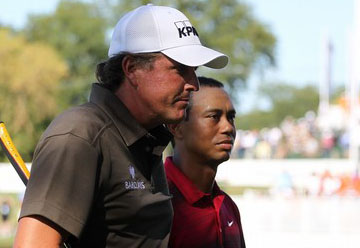When raw talent and extraordinary skill sets alone are not enough to guarantee a Ryder Cup victory anymore.
By Herschel Caldwell

Great players of the past were highly skilled at matching wits with a golf course, as opposed to trying to beat the brains out of a fellow player. Oh, there was elation in winning a match, but the jubilation mostly came from having conquered the course, rather than crushing another individual.
In his book “Golf’s Golden Age” (in America), Rand Jerris profiles the lives of golfers in the early history of our country. Well-known, along with lesser names like Hagen, Jones, Egan, MacDonald, Alcot, Zaharias, Shippen, Armour and others, could fill a hundred pages. Great men and women players gave life to other modern greats like Sarazen, Palmer, Nicklaus, Ford, Player, and Snead, to name a few. In Jerris’ book and other golfing tomes, we find a common thread woven throughout the entire golfing body of players: their unique love of the game and their extraordinary admiration for those who achieved a level of understanding each course’s personality. They not only hit a little round ball from “here’ to “there,” they “matched wits” with the course’s designer and, ultimately, with the course itself. Their respect for the game and the courses of the country allowed the men and women to focus more on the game rather than the individual and not who won or lost but how each played the game.
Augusta National requires far more of a player than long ball hitting, straight chipping and putting well. Any professional entrant can do that. Instead, Augusta National requires a relationship with the player….she demands to be respected from the outgo, pampered when it cries (rains), and tolerated when it is thirsty (dry days). Because she reacts like no other course depending on the morningmembersthe sun rises the player best beware.
Back in the day, it was not uncommon for Black golfers to gather to socialize in a course’s parking lot after play, rather than be subjected to rude comments, unwelcome stares, and resistance at being seated in a clubhouse restaurant. I well remember the parking lots of courses around the country where your money was more welcome than your presence. (That is another story for another time). After what was always a hard-fought round, we settled bets. The guys would share the available beverage in paper cups or just bottle to lips. Those bets had been placed on each player’s ability to manage the course, rather than on merely defeating an opponent.
Respect for each player’s game enabled our participants to appreciate “achievement without disparagement” of a fellow player. Thus, players could trust and support each other, whenever paired with one another to face an opposing team.
Today’s player appears to have lost the focus of the game. They have succumbed to goal winning at all cost. The mantra has become, “Go for the throat, go in for the kill, knock down the flag”—but why? Because winning is everything; that, “the more I win, the better I am perceived! The prizes become being at the top of the money list; becoming Player of the Year; Major(s)/FedX Cup champions and Number One in the world rankings. Beginning at the peewee level, Americans are intoxicated and obsessed with the idea of just winning.
Do not misunderstand. I celebrate winning, and understand that everyone loves one. However, I also believe that the winning mystique does not bode well for Ryder Cup, bi-annual golf team competition. Individualism works for The World Cup where the sport is built on team-ship. However, golf is, by definition, not a team sport. Hence, when it comes to the Ryder Cup, Americans tend to suck at it every two years.
Bi-annually, American Ryder Cup team members participate not for the money or winning, but for the honor of playing for their country. Americans have to shed that highly- developed, individualist spirit and become true team members. Historically, we had nobly done well at securing the cup, relying largely on greater golfing skills; however, it appears that playing for a team and a concept is antithetical to the nature of the current American professional golfer. The bottom line? Ryder Cup-winning will not be possible so long as it is in the American player’s DNA to win on an individual basis.
Europeans do not play for individual honors or for a particular country. Instead, they play for a cup and a continent. A cup that represents the essense of their existence as individual golfers. To them, their fellow teammates’ name or world status on the golfing stage matters little or not at all. The European Ryder Cup golfers have an intrinsic and unique bond that is tied to a common quest: retaining the symbol that speaks to the reason they play the Ryder Cup. It is that indescribable element in each European team member that allows them to play at a higher level than at any other time during the two-year period between Ryder Cup matches. Clearly, that intangible does not now exist in American Ryder Cup players.
One answer is to expand American team membership to represent all the countries of America, including Canada, Mexico, and the Caribbean We should rediscover the love of the game as a game, rather than a tool for riches and individual fame. We should also allow more opportunities for Latin and Canadian professionals to compete in PGA Tour events so that a greater awareness of the individual inter-continental personalities may be assimilated and appreciated, much like the European Tour. It is no surprise that the European Tour players can easily name players from Spain, Denmark, Sweden, Ireland, Scotland, Italy, England, and so on. Conversely, the American professional will have great difficulty naming more than one or two Latin or Canadian players, other than the few who have historically excelled on the PGA Tour i.e., Mike Wier, Scot Dunlap, Dave Marr, Lee Trevino, Chi Chi Rodriguez, Jhonattan Vegas, Camilo Villegas, etc.
For most of its history, the PGA Tour and America’s golf, in general, had been “exclusive and reclusive,” infamously restricting participation from all who were not part of the “elite” culture of the American landscape. In fact, only two African Americans (Calvin Peete and Tiger Woods) and one Latino (Lee Trevino) have ever been selected to play on the U.S. Ryder Cup team. There have been volumes written on the subject. To relive the discriminatory practices of the early days of the PGA Tour is like a “horse rode hard and put away wet.” It is encumbered upon the PGA Tour to find a way to expand membership on the Ryder Cup team to reflect the highest level of team play from more than just the contiguous borders of the United States. Unless there is a change in the way our team is selected, the United States will never dominate the Ryder Cup matches.


